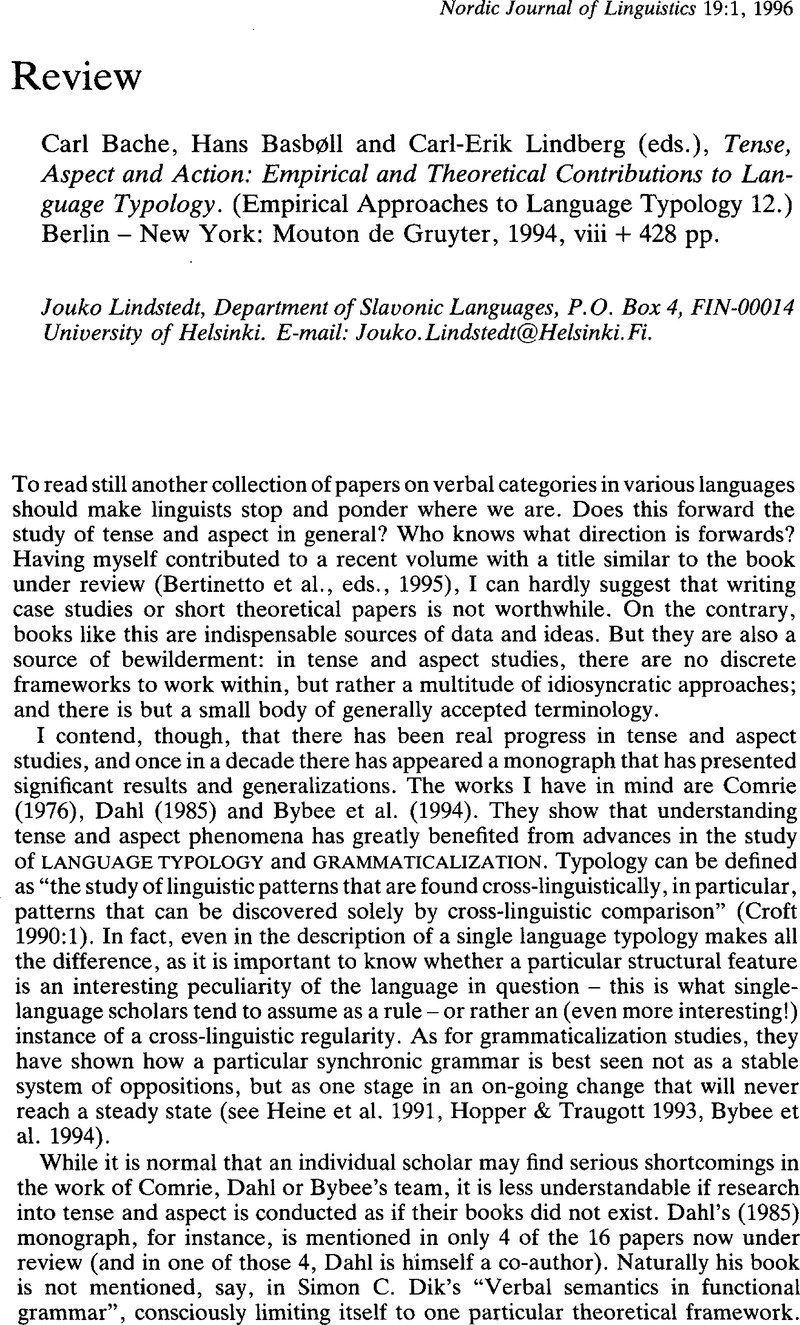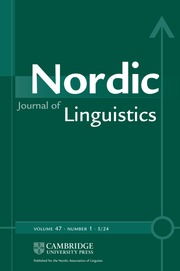No CrossRef data available.
Article contents
Carl Bache, Hans Basbøll and Carl-Erik Lindberg (eds.), Tense, Aspect and Action: Empirical and Theoretical Contributions to Language Typology. (Empirical Approaches to Language Typology 12.) Berlin – New York: Mouton de Gruyter, 1994, viii + 428 pp.
Published online by Cambridge University Press: 22 December 2008
Abstract
An abstract is not available for this content so a preview has been provided. Please use the Get access link above for information on how to access this content.

- Type
- Review
- Information
- Copyright
- Copyright © Cambridge University Press 1996
References
REFERENCES
Agrell, S. 1908. Aspektänderung und Aktionsartbildung beim polnischen Zeitworte: Ein Beitrag zur Studium der indogermanischen Präverbia und ihrer Bedeutungsfunktionen. Lund.Google Scholar
Bertinetto, P. M., Bianchi, V., Dahl, Ö. & Squartini, M. (eds.) 1995. Temporal Reference, Aspect and Actionality, Vol. 2: Typological Perspectives. Torino: Rosenberg & Sellier.Google Scholar
Bybee, J. L. 1985. Morphology: A Study of the Relation Between Meaning and Form. Amsterdam & Philadelphia: John Benjamins.CrossRefGoogle Scholar
Bybee, J. L. & Dahl, Ö. 1989. The Creation of Tense and Aspect Systems in the Languages of the World. Studies in Language 13, 51–103.CrossRefGoogle Scholar
Bybee, J., Perkins, R. & Pagliuca, W. 1994. The Evolution of Grammar: Tense, Aspect, and Modality in the Languages of the World. Chicago and London: University of Chicago Press.Google Scholar
Durst-Andersen, P. 1992. Mental Grammar: Russian Aspect and Related Issues. Columbus, Ohio: Slavica.Google Scholar
Ebert, K. 1995. Ambiguous Perfect-Progressive Forms across Languages. In Bertinetto et al. (eds.) 1995, pp. 185–203.Google Scholar
Groot, C. de & Tommola, H. (eds.) 1983. Aspect Bound: A Voyage into the Realm of Germanic, Slavonic and Finno-Ugrian Aspectology. Dordrecht: Foris.Google Scholar
Heinämäki, O. 1983. Aspect in Finnish. In de Groot & Tommola (eds.) 1983, pp. 153–177.Google Scholar
Heine, B., Claudi, U. & Hiinnemeyer, F. 1991. Grammaticalization: A Conceptual Framework. Chicago: University of Chicago Press.Google Scholar
Hopper, P. J. & Traugott, E. C. 1993. Grammaticalization. Cambridge: Cambridge University Press.Google Scholar
Jaxontov, S. E. 1983. Rezul'tativ v kitajskom jazyke. In Nedjalkov (ed.) 1983, pp. 67–80. [In the English translation of the book, pp. 113–133.]Google Scholar
Lindstedt, J. 1995. Understanding Perfectivity - Understanding Bounds. In Bertinetto et al. (ed.) 1995, pp. 95–103.Google Scholar
Mourelatos, A. P. D. 1981. Events, Processes, and States. In Tedeschi, P. J. & Zaenan, A. (eds.), Syntax and Semantics 14. New York: Academic Press, pp. 191–212.Google Scholar
Nedjalkov, V. P. (ed.) 1983. Tipologija rezul'tativnyx konstrukcij (rezul'tativ, stativ, passiv, perfekt). Leningrad: Nauka [An enlarged English translation: Typology of Resultative Constructions. Amsterdam & Philadelphia 1988: John Benjamins. (Typological Studies in Language 12.)]Google Scholar
Needham, P. (1975). Temporal Perspective: A Logical Analysis of Temporal Reference in English. (Philosophical Studies published by the Philosophical Society and the Department of Philosophy, University of Uppsala, 25.) Uppsala.Google Scholar
Vendler, Z. 1967. Verbs and Times. In Vendler, Z., Linguistics in Philosophy. Ithaca, New York: Cornell University Press, pp. 97–121.CrossRefGoogle Scholar




